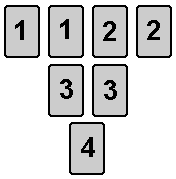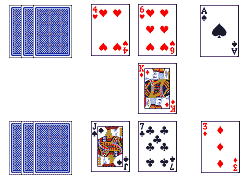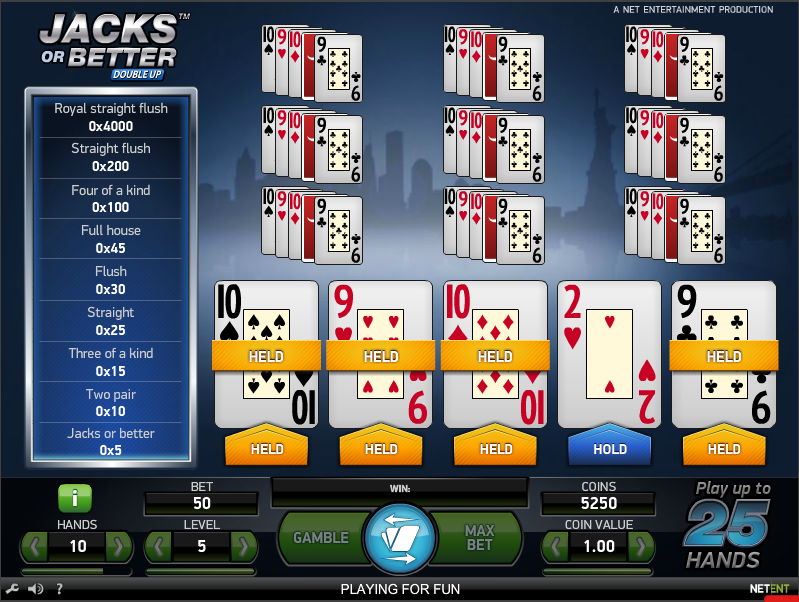Pagat Poker Variants
Mike's Most Played Poker Variants. Most Popular Home Games The following is a list of the most common games we play. It's provided to help you cut through the crappie. Poker variants are traditionally classified as draw games, stud games and shared card (community card) games, mainly according to the way the cards are dealt. However, there are variants that fall into more than one of these categories or none of them, and there are other useful but overlapping categories. Five-O Poker is a heads-up poker variant in which both players must play five hands of five cards simultaneously. Four of the five cards in each hand are face-up. Once all five hands are down, there is a single round of betting. The winner is determined by matching each hand to the corresponding hand of the opponent. Page created by JK - feel free to send me any thoughts about game variants, especially Reversi and 4iar and we can discuss things more thoroughly. Croker (Cribbage-Poker) Could be suitable for as many players as a standard game of poker, as there is only 6 cards per hand, plus three community cards. So with 6 players, only 39 cards will be used. Poker Variants Edit. Poker is a very popular pastime, these days. There are lots of poker games, though, so they can be confusing. Luckily, the most popular kinds can, for the most part, be sorted into three families. The first group is community poker games. In community poker games, players receive a certain number of hole cards.
- Pagat Poker Variants List
- Pagat Poker Variants Poker
- Pagat Poker Variants List
- Pagat Poker Variants Game
- Poker Variants Rules
OBJECTIVE OF POKER WITH TWO HANDS: Win the pot with the best hand.
NUMBER OF PLAYERS: 2-5 players
NUMBER OF CARDS: 52-card deck
RANK OF CARDS: A (high), K, Q, J, 10, 9, 8, 7, 6, 5, 4, 3, 2
TYPE OF GAME: Casino
AUDIENCE: Adult
INTRODUCTION TO POKER WITH TWO HANDS
There are several variations of Poker which utilize two hands in the game, such as Chinese Poker and Pai Gow Poker. Below are poker games which are played with two hands, although these instructions assume the reader is familiar with traditional Poker and the Poker Hand Rankings.
Open Face Chinese Poker, not to be confused with the variant of Chinese Poker mentioned above, is three hand poker- not two.
HENWAY
This is a split pot game is played with up to 5 players, each dealt 10 cards after placing an ante.
Players split the 10 cards into 2 five card hands. After the player’s hands are arranged, each player flips the top card of each of their hands over, so that it is visible. This is followed by a round of betting. This pattern of play continues for the second, third, and fourth cards in hand. Following the fourth round of betting, players reveal their hands. Highest ranking and lowest ranking hands split the pot evenly.
10 CARD REGRETS
Ten card regrets is also a split pot game that accommodates no more than five players. Players are dealt 10 cards each which are arranged into two five-card poker hands: on the left a low hand and on the right a high hand.
After placing an ante, players are dealt two cards at a time, face-down. After, they decide whether these cards are going to be a part of the left hand, the right hand, or one to each. After each player has had their turn there is a round of betting.
The deal repeats, and players are dealt another two card, followed by another round of betting.
This continues until each player has 2 five-card hands. Once a card is assigned to a hand it cannot be moved nor can the hands exceed five cards.
At showdown, the pot is split between the highest and lowest hands, they must be won by the proper corresponding hand, i.e. a right hand cannot win low hand.
COWPIE POKER
The deal and betting process is the same as Seven Card Stud.Seven card stud is simplified as, “two down, four up, one down,” which refers to the quantity and order of the way cards are dealt, with betting rounds in between each card.

After all the players have seven cards, they are split into a five card and a two card hand. Cards dealt face-up and face-down remain that way. The five card hand must be higher ranking than the two card hand and include at least one face-down card. A final betting round occurs and next is the showdown. The pot is to be split between the best five card and two card hands.
REFERENCES:
https://www.pagat.com/poker/variants/two.html
http://www.wsop.com/poker-games/7card-stud/rules/
https://en.wikipedia.org/wiki/Seven-card_stud
https://www.pagat.com/poker/variants/7stud.html#hilo
https://en.wikipedia.org/wiki/Poker
- Baseball - variants
- No Peek - variants - Mexican Sweat
- Night Baseball - variants
Baseball
Baseball is a popular home poker variant based on seven card stud. All threes and nines are wild and fours give the player an extra card. The numbers are chosen because of their significance in the American sport - three strikes, three outs, nine innings, four balls for a walk. Because of the extra cards dealt after fours, this game cannot be played by more than six people without the risk of running out of cards.

The deal is as in seven card stud: two cards face down, four face up and the last face down. There are five betting rounds, one after each round of face up cards and one after the final card is dealt. Each betting round is begun by the player with the highest hand showing at the time. If the cards run out in a seven-player game, it will be necessary to deal the last card as a face up community card instead of dealing a down-card to each player.
In the showdown the highest five-card poker hand wins. All threes and nines are wild and can be used as any card not already present in the player's hand, or as a fifth card of any rank to make five of a kind, which is the highest hand type - see also poker ranking with wild cards.
If a player is dealt a four face up, the player is immediately dealt an extra face up card before the next player receives a card. Such players will have eight, nine or more cards at the showdown.
Variants
Some play that a player who is dealt a three face up must immediately either match the pot or fold. Some only require a fixed payment to the pot as an alternative to folding.
Some play that face down fours also entitle the player to an extra card. Practice varies as to when the player should reveal the four and claim the extra card, and whether the extra card is dealt face up or face down. Possible rules for claiming extra cards for face down fours are:
- the four must be revealed as soon as it is dealt, and the extra card is dealt immediately;
- any concealed fours are revealed in clockwise order and extra cards given immediately before the next betting round;
- concealed fours may be revealed whenever the holder wishes, and an extra card is given as soon as the four is revealed.
Some play that the extra card given when a four appears must be paid for. The price may be a fixed amount paid to the pot or may vary according to whether the extra card is face up or face down, and how late in the game it is dealt.
The wild cards and the card which entitles the player to an extra card can of course be varied. For example in Football threes and sixes are wild and you get an extra card for a two. In Woolworth fives and tens are wild and you get an extra card for a two.
No Peek
The dealer deals seven cards face down to each player. Players must not look at their cards.

The player to dealer's left flips his or her first card face up, and starts the first betting round.
The next active player in clockwise order then flips up cards until showing a hand that beats the first player's card, and then begins a second betting round. For example if the first player flipped a 9 and the second player a jack, the second betting round starts immediately. If the first player flips a 9 and the second player a 5, the second player must flip another card. Suppose it is a seven. 7-5 still does not beat the 9 so a third card must be flipped. If this is another 5, the second player now has a pair, which beats the 9, so the second betting round starts.
This continues clockwise around the table. At your turn, if you have not folded, you must flip cards until you have the best poker hand showing, and then begin a new betting round. If you flip all seven of your cards and still do not have the highest hand showing you must drop out: there is no betting round and the turn passes to the next active player.
This continues until all cards are face up or there is only one player left in. The highest hand wins the pot.
When comparing hands, any kicker beats a missing card, so for example 7-3 beats a 7 by itself. Flushes and straights must have five cards to count. See poker ranking - incomplete hands for details.
Variants
Some begin by turning up a card from a second deck. The player to dealer's left must start by flipping cards until able to beat this card, before beginning the first round of betting.
Some play with back betting. When a player flips all seven cards without beating the best hand, and is thereby knocked out, there is a round of betting begun by the best hand showing before the next player begins flipping cards.
Mexican Sweat
In this variant of No Peek, seven cards are dealt to each player and one face up in the middle of the table. The first player must beat this face up card before the first betting round begins.
Pagat Poker Variants List
If any player flips one of the three cards of the same rank as the face up card in the middle, that player must immediately fold. By prior agreement there may or may not be a betting round before the next player starts flipping cards.
Night Baseball
This game, also known as Midnight Baseball or No Peek Baseball, is a combination of Baseball and No Peek.
The deal and the procedure for flipping cards are the same as in No Peek, but as in Baseball, all threes and nines are wild.
Any player who flips a four is immediately dealt an extra card face down from the deck.
Pagat Poker Variants Poker
Variants
All Baseball and No Peek variants can be used here too. For example players may have to pay or fold when flipping a three. They may have to pay for the extra card dealt when a four appears. The first player may have to beat a card truned up from another deck before the first betting round. 'Back betting' may or may not be included.
The Good, The Bad, and The Ugly
The deal and betting are the same as in seven-card stud, with the following modifications.
After the initial deal of two down cards and one up card to each player, three cards are dealt face down to the table.
After the fourth card is dealt to each player, the dealer turns one of the table cards face up. This is The Good: all players' cards which are the same rank as this card are wild.
After the fifth card is dealt, the second table card is turned face up. This is The Bad: all cards of the same rank as this card must be discarded.
After the sixth card is dealt, the final table card is turned face up. This is The Ugly: anyone who has an up card of the same rank as The Ugly must immediately fold.
After the seventh card is dealt, the final betting round and showdown take place as usual. Note that the three face up cards on the table are not shared (community) cards - they cannot be used by players to complete their hands.
Sequence
The deal and betting are same as in seven-card stud.
- If a two is dealt as a face-up card, all twos become wild.
- If a three is dealt face up when twos are wild, twos cease to be wild and threes become wild instead.
- If a four is dealt face up while threes are wild, threes cease to be wild and fours become wild instead.
- And so on...
Note that for the wild card to be created and changed, the upcards must appear in increasing order, starting with the two. If a three is dealt face up before a two appears, there is no wild card yet. If a two appears subsequently, twos are wild, not threes, despite the presence of the previously dealt three. The wild cards do not have to be consecutive: if the upcards are 6, 2, Q, 5, 3, 9, 4, A in that order, 4's are wild.
Pagat Poker Variants List
At the showdown, the high hand wins the pot.
Alternatively, the game can be played high/low with declaration.
Second Hand High
The deal and betting are the same as in seven-card stud, but if there is a showdown, the second highest hand wins.
If all but one player fold, the surviving player wins as usual.
The Game Report site, which described this variant, did not specify how to deal with ties. I suggest that if there is a tie for first place, none of those equal hands wins but the next highest hand takes the pot. If there is a tie for second place, the equal hands should split the pot.
Pagat Poker Variants Game
Jack the Shifter
For this game to work, the group must have an agreed list of seven-card stud games that they normally play. The game begins as ordinary seven-card stud played for high, but whenever a jack is dealt as an upcard, the player who receives the jack can change the game to any seven-card stud game on the agreed list.
An explicit or implicit agreement on the list of allowable games is needed to prevent a player who receives a jack inventing a new game on the fly to favour the particular hole cards he has been dealt.
Poker Variants Rules
In addition, a player who is dealt a face-down jack may reveal it at any time before the final round of betting and name a game. Immediately before the final betting round, the dealer offers each player in turn a final chance to reveal a jack, after which no fiurther changes are possible.
The high hand wins the pot, unless the winning condition has been changed by a player with a jack.